UAE National Day 2020: Seeds of religious tolerance sown in UAE even before the union was formed
Community leaders hail freedom of worship for expats from the early days
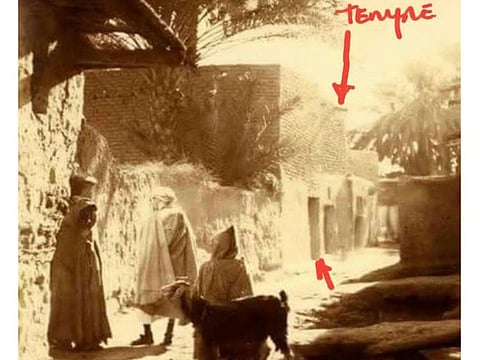
Dubai: At 49, the UAE is a young country compared to the nations where the majority of expatriates have come from. However, Hindu and Sikh religious leaders vouch for the fact that this has been a land of tolerance and harmonious coexistence of Emiratis and expatriates from the early days of migration centuries ago.
The UAE is officially the first country in the world to have a Ministry of Tolerance, but there are records of the existence of a Krishna temple (Shreenathji Haveli) in Bur Dubai since 1935, which bears testament to the religious tolerance of the leaders of the tribes who ruled the erstwhile Trucial States, said Lalit K. Karani, chairman of the temple. “Many locals believe the temple had been there since 1902. The temple management is in possession of an old picture of the lane going towards the current day Shreenathji Haveli,” he told Gulf News. Pointing to the ancient building in the photo where the temple is said to have existed previously, he said a temporary structure was built there as a place of worship.
Many locals believe the temple had been there since 1902. The temple management is in possession of an old picture of the lane going towards the current day Shreenathji Haveli
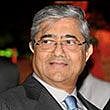
Since then, Karani said the temple has been coexisting with a mosque in the vicinity, exemplifying the harmony and camaraderie extended by the local people to the Indians who had first settled in old Dubai. “The prayer timings at the mosque and the temple are around the same time, but the rituals do not infringe upon each other’s sanctity. This is a perfect example of religious harmony and tolerance in this country,” said Karani, who has lived in the UAE since 1966.
Typical temple with well, cow
He said the Krishna temple was a standalone house that was later converted into a temple. “We had a well and a cow and daily prayers back then. Every morning, traders would come, clean the temple premises, perform puja before opening their shops.”
Meanwhile, the worshippers of Lord Siva had also set up a temple on top of the old shops and houses next door, facing Dubai Creek. It is a well-known fact that the former Ruler of Dubai, late Sheikh Rashid bin Saeed Al Maktoum, used to attend Diwali celebrations organised by the Indian community members. According to the religious heads, the greatest example of religious tolerance allowed by generations of Rulers of this land is their generous gifting of land for various places of worship.
In 1957, Sheikh Rashid handed over the official document for the land of the Krishna temple to the Mercantile Hindu Community of Thatta (from Sindh in undivided India) for the believers to pray and celebrate their festivals, said Karani.
The old temple got a facelift in 1957 and had a major renovation 40 years later. “With permission from Dubai Municipality, we renovated the temple and created the look of a temple. There is a hall that can accommodate 100 people. We thank the leaders of the UAE for allowing worshippers to continue to visit the temple for Diwali even during the COVID-19 pandemic, by following the safety protocols.”
Karani said he had witnessed the celebrations of the Union Formation. “When the Rulers got together at the Union House, we had a big celebration. My family has been here for three to four generations. Seeing the growth of the city and the whole country for several decades, we expats feel that this is our homeland and we pray for this land and its Rulers.”
Hindu temple has new land in Dubai
Echoing the opinion that the seeds of tolerance were sowed in this land many decades ago, Vasu Shroff, the chairperson of the main Hindu temple complex dedicated to Shiva, Ganesha, Hanuman and Shirdi Sai Baba, said the temple complex was established in 1958.
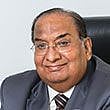
Before COVID-19, he said, the temple used to welcome more than 225,000 devotees every month from different parts of South Asia. “We have also been able to reach out to many individuals in need and provide a community to fall back on. In fact, the foundation stone for the second temple in Dubai has already been laid at Jebel Ali. This will make worship convenient for many more. I can’t thank the UAE leaders enough for their tolerant and progressive views without which none of this would have been possible,” he said, wishing the country every success “towards the next 50”.
First stone temple in Abu Dhabi
While it is remarkable that the Hindus in the UAE have been enjoying religious freedom at the age-old temple complex in Dubai’s Meena Bazaar for several decades, the announcement of Abu Dhabi allowing land for building a state-of-the-art traditional stone temple hit the headlines during Indian Prime Minister Narendra Modi’s visit to the UAE in 2018.
Swami Brahmaviharidas, the head priest of the BAPS Hindu Mandir, the upcoming temple in Abu Dhabi, said tolerance here is not a dream but a duty. “This we have experienced with the generous donation of land for the BAPS Hindu Mandir and untold warmth and support from the compassionate Rulers and leaders at every stage.”
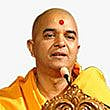
The UAE’s Golden Anniversary of 50 Years, he said, is a national celebration of international participation. “The UAE is a nation of many nations, a home of many hearts. The UAE’s mantra of tolerance and harmony has been echoing through history, going beyond 50 years. For us, the National Day celebrations are, in fact, a world celebration as the UAE Government sets out the blueprint for communal harmony in these challenging times when divisions are widening and fences are hardening,” he said, adding: “We look forward to the next 50 years of peaceful life and growth while sustaining traditional universal values. May the UAE’s Golden National Day be one of global hope and harmony,” he added.
Region’s largest Sikh Gurudwara
The UAE is also home to a large Sikh community mainly hailing from India. The Guru Nanak Darbar Gurudwara in Dubai’s Jebel Ali is the main place of worship for the Sikhs.
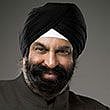
Kandhari pointed out that the values of tolerance and acceptance were also manifest when His Highness Sheikh Mohammed Bin Rashid Al Maktoum, Vice-President and Prime Minister of the UAE and Ruler of Dubai, granted 25,400 sqft of land for free to build the world’s most modern and the region’s largest gurudwara, the Guru Nanakji Darbar in Dubai.
“Life was good even before the federation of the seven emirates was formed from the Trucial States, in 1971. Back then, as the Ruler of Dubai, late Sheikh Rashid and the then Ruler of Abu Dhabi, late Sheikh Zayed bin Sultan Al Nahyan, were visionaries to have a congenial atmosphere for a multicultural community. Thus it is the foresight and tolerant approach of the Emirati leaders, which is proving to be a boost for the advancement [of tolerance and harmony] in UAE.”
Under the leadership of President His Highness Sheikh Khalifa bin Zayed Al Nahyan; His Highness Sheikh Mohammed Bin Rashid Al Maktoum, Vice-President and Prime Minister of the UAE and Ruler of Dubai; His Highness Sheikh Mohammed bin Zayed Al Nahyan, Crown Prince of Abu Dhabi and Deputy Supreme Commander of the UAE Armed Forces, the country has further built on the legacy of its founding fathers, said Kandhari. “The UAE is committed to be at the forefront of enabling a harmonious co-existence for all religions and cultures in propelling a progressive society through the value of tolerance. The UAE has made tolerance a global initiative and has taken the concept of unity in diversity to another level. This approach is a defence against the toxic influences of parochial mindsets,” Kandhari said, wishing the Rulers, Emiratis and all UAE residents a very Happy National Day.
Sign up for the Daily Briefing
Get the latest news and updates straight to your inbox







